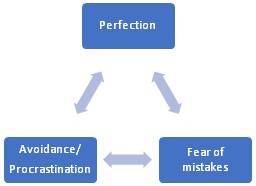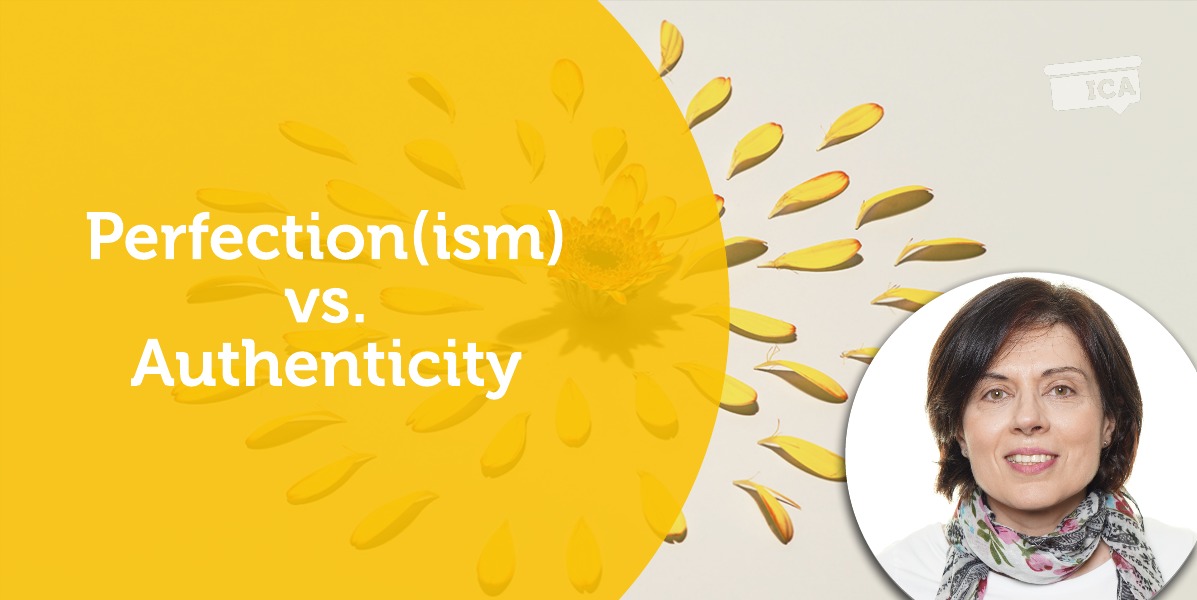A Coaching Power Tool Created by Olga Valadon
(Leadership Coach, UNITED KINGDOM)
Perfection doesn’t exist in anyone. Striving for perfection in any part of our lives is a recipe for failure since it can never be attained. Dr. John Grohol
We are constantly looking for perfection in ourselves. We want to achieve everything in life and everything has to be perfect. Anything less than perfect doesn’t matter. Anything less than perfect counts as a failure. We are expecting ourselves to be always on top of the game – perfect daughters or sons, perfect students, perfect partners, perfect parents, perfect employees, or bosses. We are also expecting the same from others.
Our quest for constant perfection is exhausting and finally becomes a burden creating feelings of unfulfillment and unhappiness for us and all those around us. “If you look for perfection, you will never be content” (Anna Karenina: Leo Tolstoy, 1877). The continuous barrage of images of projected and perceived perfection on social media leads a lot of people in the trap of chasing the impossible which in turn leads to negative feelings and mental health problems. Perfect kids, perfect marriages, perfect houses, perfect cooking, perfect clothes or hair, perfect body, perfect job … the list is endless!
For a long time, I thought that by being perfect I was holding myself to high standards and that is true strength. To be perfect in everything, I ended up doing too much and that led to anxiety. I refused to acknowledge the signs and the root of the problem until life came crashing down and I was in the throes of full-fledged burnout.
The line between the healthy pursuit of excellence and perfection(ism) was blurred and my obsession had started impacting me and all those around me, putting significant strain on relationships. It was time to change! To do that, I had to explore first my underlying beliefs and better understand my obsession -its drivers, what is costing me, and whether it’s worth it. This exploration made me realize how much time and energy I was spending on being perfect on things that don’t matter to me (although they may matter to others), things that didn’t even play to my strengths and passions. In the pursuit of perfection, I became obsessed with the end goal delivery and I put many rules on how to achieve it, how to behave, and how to sustain the image of perfection in the eyes of others. I didn’t value my personal story of growth and achievement which by then it had been consigned to the bottom of the drawer.
What people saw, though, wasn’t my true self but a persona tailored to the expectations of the society and culture I live in. I had lost my authenticity and with that all the things that truly energized me and gave me a purpose in life. It was time to revise my expectations so, the reset process started. It was time to learn to be myself.
If you don’t like something, change it. If you can’t change it, change your attitude. Don’t complain. Maya Angelou
In the pursuit of perfection
Perfection is defined as “a state, variously, of completeness, flawlessness or supreme excellence” (source: Wikipedia). These two terms (flawlessness and excellence) co-exist in the definition but they don’t mean the same thing. According to the English dictionary, flawlessness means “having no defects or faults, especially none that diminish the value of something”. Excellence, on the other hand, is defined as “possessing an outstanding quality, remarkably good”. There is scope for improvement in excellence while flawlessness is definitive – no shortcomings or defects are allowed.
The Greek philosophers didn’t seem to agree either on the definition of perfection. For Aristotle, “perfect” was synonymous with “complete” (nothing to add or subtract). Empedocles, on the other hand, believed that perfection depends on incompleteness (source: Wikipedia) which is a paradox – something is perfect by being imperfect!
Perfection, in the context of excellence, drives the human race forward leading to significant advances (in technology and medicine, to name but a few). Perfection though in the context of flawlessness, serves no real purpose, and instead, it holds people back. We don’t move forward from fear of making mistakes. This fear can be paralyzing at times, leading to procrastination and there begins a never-ending, vicious circle.
 Figure 1: The vicious circle of perfection
Figure 1: The vicious circle of perfection
So, where does our obsession with perfection come from? It stems from the underlying belief that we are not good enough, a belief which we may have been carrying with us since childhood and which has been formed and reinforced often by those around us (our parents or teachers). We then go about on our life journey holding tight onto that belief, even when we know that it doesn’t serve us.
We set up unrealistic expectations in the belief that the perfect execution, a flawless performance, will redeem us in the eyes of others and will give us the cherished prize, our self – worth. What we do becomes who we are. The outcome is measured not by the number of things that went right and the things we learned and who we have become but by the few things that may not have gone well. We let what we do define us and performance is confused with the person (unfinished business: David Cooper,2013). Instead of finding our self-worth, we are left with self-doubt, disappointment, low self-confidence, and self – esteem.
So, what if we were to let go of perfection? What would life look like if we didn’t try to fit in and conform to the standards and expectations imposed by others but instead, we were staying true to ourselves?
Reclaiming your authenticity
Authenticity is a collection of choices that we have to make every day. It’s about the choice to show up and be real. The choice to be honest. The choice to let our true selves be seen. Brene Brown
Breaking free from the shackles of perfection opens the path to finding your authentic self. The focus finally shifts from external (“what you do”) to internal orientation (“who you are”).
Being authentic may come naturally to some people while for others bringing their authentic self on the surface is a long process, sometimes a lifelong journey. Being authentic requires dropping the mask, letting your armor down, and taking the risk of showing the world who you are. It is scary because others will judge you and if they don’t like what they see, you may no longer fit in.
To be authentic requires that you rumble with vulnerability (Dare to Lead: Brene Brown, 2018). You are not perfect and you are not ashamed to admit it. You put a great effort into whatever you do. Sometimes you succeed, sometimes you don’t and that is fine. Others may call that “failure”, you call that an “opportunity to learn and grow”.The perseverance and resilience you built along the way made you the person you are today. You fall but you get up every time and you start again.
Authenticity means “knowing your why” (Find you why: Simon Sinek, 2009). You are clear on your values and purpose and you give them the power to yourself to choose how to show up in life, rather than letting others make the choices for you. Your actions, decisions, and choices are aligned to your values every step of the way. Your courage to be yourself and not to succumb to the perceptions and expectations of the herd is evident and contagious. Your life story becomes a powerful tool, a source of inspiration and paves the way for others to follow.
If you are always trying to be normal, you will never know how amazing you can be. Maya Angelou
It is time to turn a leaf, to start showing yourself kindness and compassion. It is time to embrace and celebrate who you are!
Coaching application
I have been coaching new and aspiring leaders in corporate organizations for many years and perfectionism is a recurring theme. Using my coaching model (“4Ds for Focused and Impactful Leadership”), I invite the clients to develop (or deepen) awareness by exploring who they are, who they want to be as leaders and validate the alignment of the goal brought into the conversation with their values and beliefs (Congruent leadership: David Stanley, 2017).
Through the process of questioning and exploration, it frequently comes to light that the underlying issue is a conflict between the decision the clients want to take and the decision they “should” take based on expectations set by the company and senior leaders. The former path requires bravery as it goes against the status quo and possibly puts them in an awkward position, jeopardizing future opportunities for promotion. The latter is the easy path which usually paves to way to significant future rewards but also inner frustration because these are decisions they don’t agree with.
When this conflict arises, I invite the clients to do the following exercise:
Step 1: Imagine you take the decision that is best aligned with your values.
Step 2: Imagine yourself 10 years from now, being a successful senior leader in the organization. You have been successful because you took the easy path, the decision that met the expectations of others.
Step 3: Imagine yourself writing the speech for your retirement party.
By the end of the exercise, the clients are clear on which decision is right for them and move towards an action plan. Do all clients opt for the route to authentic leadership? No, not all of them go down this path. Sometimes, external factors play a significant role in their decision-making process (e.g. a promotion may be very appealing to someone who needs a pay rise). Having explored the issue though during the conversation, the client feels comfortable with their decision as it has been made consciously. On the other hand, those clients who make a decision based on their values make the first step towards embracing their authentic self and start the process of self-acceptance and self- actualization as leaders.
Authenticity is about being true to who you are, even when everyone around you wants you to be someone else. Michael Jordan
References:
Various quotes: https://www.wiseoldsayings.com
https://www.goodreads.com/quotes
Leo Tolstoy (1877). Anna Karenina. The Russian Messenger.
Perfection definition: https://en.wikipedia.org/wiki/Perfection
David Cooper (2013). Unfinished business: Change Your Thinking, Deal with Your Past and Move On. Charisma House.
Brene Brown (2018). Dare to Lead. Penguin Books.
Simon Sinek (2009). Find you’re why. Penguin Books.
Stanley, David (2017). Congruent Leadership Defined, JOJ Nurse Health Care, Volume 3, Issue 3, August 2017
